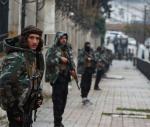You are here
From ‘special operation’ to partial mobilisation
Sep 22,2022 - Last updated at Sep 22,2022
Nearly 70 years ago, a new world order was born from the ruins of World War II. However, this global system is marred by major rupture signs, starting with conflicts in Asia, Europe and Africa, ending with the energy and food security crisis, with the decline in the level of democracy at the global level. Taken together, these problems mean that our world must change. What is happening today in every part of the world has nothing to do with the weakness of major powers and actors on the international scene, but rather it is more related to intellectual problems, identity and purpose.
To understand where the world is heading, it is useful to be aware that the major countries are practicing isolationism occasionally and internationalism sometimes in line with their interests and motives for regional and ideological expansion globally. The motives of the major world players stem from their concern for their national security, and this explains their intervention in countries that may constitute a source of danger to them and their national interests. In the doctrine of the major powers, their national security stems from their keenness to prevent the rise of other forces hostile to their policies, basic security interests, and the economic well-being of their peoples, at all costs.
On 21 September 2022, the world stood in anticipation of what Russian President Vladimir Putin would say to his people, what the US President Joe Biden would say to the world, and what China would say about its dispute with the West over Taiwan. The problem today is that we have become a world without borders because everyone wants to defend their national interests outside their borders.
Millions of people were watching Russian President Vladimir Putin’s speech on his country’s partial mobilisation of 300,000 people to join the Russian army. What is the significance of such a decision and why now?
On 21 September 2022, Putin announced the decision of partial mobilisation when he signed a decree declaring partial mobilisation with instant effect. Partial mobilisation is based on the implementation of the recruitment of citizens of the Russian Federation who have previous military experience, or who have undergone military courses in the army, and have a certain level of training, to participate in battles and wars.
Putin's declaration of mobilisation in Russia means that the Russian leadership has taken a decision to move from the stage of a "special operation" to the declaration of "protecting Russia's sovereignty" against any military threats from the NATO.
Now the battle has entered the stage of war which is a comprehensive battle related to the sovereignty of Russia itself, by involving all Russians, not only the armed forces.
According to Putin, Russia is ready to use "all means" to protect its territory, including Moscow's willingness to use weapons of mass destruction if it is forced to make such a decision.
The declaration reflects Russia's quest to achieve specific goals before the start of the winter season and the end of the special operation phase, a prelude to a new phase of the conflict in Ukraine.
The current war in Ukraine reflects an international conflict of an unusual type. It is not a war between two countries, although Russia and Ukraine are directly involved, nor is it a war between two different ideological camps, despite the participation of NATO with military and financial assistance, but rather a war between major powers competing for leadership of the international world order.
It is noted here that this war did not erupt due to a conflict over resources and assets, or over land and borders, but rather because of the inconsistency of the rules and institutions responsible for managing the current international system and the desire of the rising powers to change them. Therefore, this war in Eastern Europe is similar to an elephant fight on the international lawn, which will have very negative ramifications on the entire world unless peace talks prevail.
The outbreak of this war, with its aforementioned dimensions, is in itself evidence of the weakness of the institutions of the current international system and the collapse of its foundations. The United States and its allies believe that Russia’s use of armed force against Ukraine is a serious violation of the most important rules contained in the Charter of the United Nations, which prohibit the use of force in international relations or even the mere threat of its use.
Since Russia sees at the same time that its use of military force against Ukraine does not constitute a violation of international law or the Charter of the United Nations, but rather a realisation of the right of legitimate self-defence, this means that we are facing a situation in which all parties to the conflict claim that they base their claims on the same legal references. The entity entrusted with determining the offender and the defender party is the Security Council in this case, which cannot play the required role.
September 21, 2022 is prelude to a new change by all means where international alliances will be reshaped.












